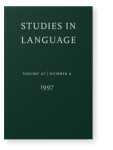Vol. 21:2 (1997) ► pp.287–311
The Relevance of Factivity to Complementizer Choice in Japanese
This article re-examines the correlation between factivity and complementizer choice in Japanese. Kuno (1973) argues that the concept of factivity proposed by Kiparsky and Kiparsky (1971) to analyze the choice of complement types in English is a determining factor in complementizer choice in Japanese. Observation of data collected for this study indicates that there are numerous instances that cannot be accounted for using the concept of factivity. Complementizer choice in Japanese is determined, not by factivity of the predicate, but by the degree of internalization of the information/proposition expressed in the complement.
Cited by (3)
Cited by 3 other publications
This list is based on CrossRef data as of 18 july 2024. Please note that it may not be complete. Sources presented here have been supplied by the respective publishers. Any errors therein should be reported to them.
